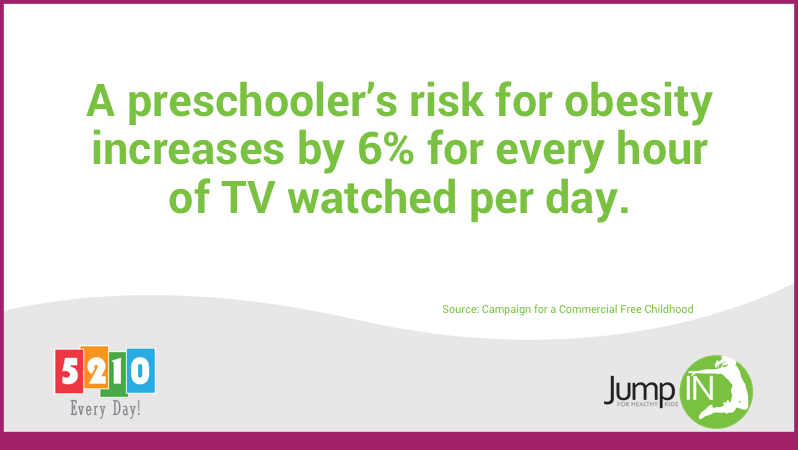What is healthy? 4 steps anyone can take.
Have the Olympics triggered conversations in your house about sports and having a healthy body? Now is a great time to talk about the connection between physical activity and staying healthy. You don’t have to be a world-class athlete to have strong bones and muscles. Here is a simple formula that you can use every day (you may already be doing one or more of these activities) to help your body function in good form.
Our friends at Let’s Go! created a simple slogan to help you remember four ways to be healthy every day: 5-2-1-0. These research-proven recommendations come from experts at the American Academy of Pediatrics, U.S. Department of Health and Human Services, and Centers for Disease Control and Prevention.

Eat at least 5 servings of fruits and vegetables
When you think about eating healthy, focus on increasing the amount of fruits and vegetables you eat. This strategy is more helpful—and more likely to become a lifelong habit—than trying to completely cut out other foods that you love.
Summer in central Indiana is the perfect time to taste fruits and vegetables and experiment with new recipes, because fresh, affordable produce is in season. You might want to check out a local farmers market to find fresh produce and get ideas about how to prepare it.
Look for ways to incorporate fruits and veggies into other foods that you love: make a smoothie, experiment with different dips, add vegetables to scrambled eggs, or try vegetable soups hot or cold.

Find more ideas in our Resource Hub: 50 Ways to Add Fruits and Vegetables
Limit recreational screen time to 2 hours or less
Step away from digital devices such as TVs, computers, tablets, and phones. Excessive screen time has been linked to weight gain, increased risk for chronic disease, poor sleep, and difficulty concentrating.
Watch for the technology traps in your everyday habits and reduce the temptation: turn off televisions and other devices during dinner, don’t place electronics in bedrooms, set a timer for an appropriate amount of screen time and do something else when time is up.
Replace sedentary screen time with physical activity, and you’ll see even more health benefits. Ask everyone in the family to unplug and take a walk together. Play games like Freeze Tag or Red Light/Green Light with kids. Or simply turn on some music and dance.

Too much screen time? Get the facts, plus tips for cutting back.
Get at least 1 hour of physical activity
As you might guess from the suggestions above, you don’t need fancy equipment or gym memberships to be physically active. You don’t even need to get your hour of activity all at once; short bursts of physical activity are just as effective as one long exercise session.

So walk the dog instead of simply letting him out in the backyard, choose stairs over elevators, park far away from entrances and walk,…these are all simple strategies that can help you accumulate an hour of physical activity each day. Active play is physical activity, too, so have fun meeting the daily goal.
More strategies for success: 10 Tips for Becoming More Active as a Family
Drink 0 sugary beverages, more water
Adults and children consume about 400 calories per day in beverages alone. Replacing sugary beverages like soda and fruit juice with water can substantially reduce your calorie intake.

Experiment with infused water recipes by adding sliced fruits and herbs to a pitcher of water. If you can’t resist ordering your favorite soda when dining out, enjoy one glass, then ask for water on the second round.
Do you know how much sugar you (and your kids) drink? Get the scoop…and additional tips for cutting back.
Craving more tips?
Subscribers to this blog get practical tips and ideas to help meet these daily health goals at home, work, school, and child care every week. If you’re not already a subscriber, join the conversation!
Topics: 5210, Healthy Eating, Physical Activity
Subscribe for more
Want more ideas for healthy schools, workplaces, child care providers, and families? Subscribe to our blog for weekly tips delivered right to your inbox!
How can healthcare providers help prevent childhood obesity? NEXT »
Tips for a Healthier Breakfast
